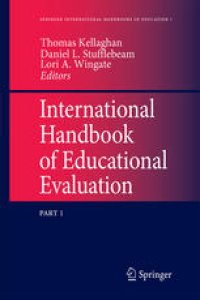
Ebook: International Handbook of Educational Evaluation
- Tags: Assessment Testing and Evaluation, Administration Organization and Leadership, Educational Philosophy
- Series: Kluwer International Handbooks of Education 9
- Year: 2003
- Publisher: Springer Netherlands
- Edition: 1
- Language: English
- pdf
Thomas Kellaghan Educational Research Centre, St. Patrick's College, Dublin, Ireland Daniel L. Stufflebeam The Evaluation Center, Western Michigan University, Ml, USA Lori A. Wingate The Evaluation Center, Western Michigan University, Ml, USA Educational evaluation encompasses a wide array of activities, including student assessment, measurement, testing, program evaluation, school personnel evalua tion, school accreditation, and curriculum evaluation. It occurs at all levels of education systems, from the individual student evaluations carried out by class room teachers, to evaluations of schools and districts, to district-wide program evaluations, to national assessments, to cross-national comparisons of student achievement. As in any area of scholarship and practice, the field is constantly evolving, as a result of advances in theory, methodology, and technology; increasing globalization; emerging needs and pressures; and cross-fertilization from other disciplines. The beginning of a new century would seem an appropriate time to provide a portrait of the current state of the theory and practice of educational evaluation across the globe. It is the purpose of this handbook to attempt to do this, to sketch the international landscape of educational evaluation - its conceptual izations, practice, methodology, and background, and the functions it serves. The book's 43 chapters, grouped in 10 sections, provide detailed accounts of major components of the educational evaluation enterprise. Together, they provide a panoramic view of an evolving field.
The International Handbook of Educational Evaluation is an invaluable and unique reference work for evaluation scholars and specialists, educators, policymakers, graduate students in evaluation and education, administrators and other school personnel, as well as personnel in funding organizations.
The Handbook:
-addresses both theoretical and practical areas of educational evaluation;
-provides up-to-date, comprehensive coverage of core concepts, methods, and areas of application;
-reflects the perspectives and experiences of leading evaluation scholars and practitioners from around the world;
-brings together a large group of notable authors presenting diverse national contexts; and
-presents in-depth treatment of core concepts and best ideas on how to design and conduct sound evaluations in education.